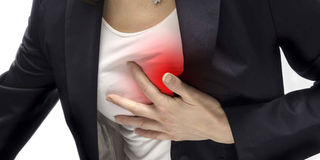What causes a heart attack and how can I avoid it?

A woman suffers a heart attack. A heart attack happens when there is reduced or no blood flow and reduced oxygen going to a part of the heart. PHOTO | FOTOSEARCH | NATION MEDIA GROUP
Dr Flo,
What causes a coronary or cardiac arrest? Can anxiety cause this? How can one maintain peak heart condition? Could you recommend a diet plan and exercise regimen?
Ali
Dear Ali,
A coronary (event) or a heart attack happens when there is reduced or no blood flow and reduced oxygen going to a part of the heart, causing death of the heart muscle. It usually happens over several days and causes a squeezing chest pain, shortness of breath, dizziness and nausea. Women may experience pain in the jaw, neck, back or arm. Most of the time, a heart attack occurs due to a clot in heart blood vessels that are hardened by fatty calcified deposits (atherosclerosis). Risk factors include having a close relative who had a heart attack, obesity, diabetes, high blood pressure, smoking and lack of exercise. Stress, exertion and sudden excitement can trigger a heart attack. Severe anxiety can trigger a heart attack, but it can also lead to a panic attack, which may feel like a heart attack. A panic attack starts with a feeling of sudden fear or discomfort, then there is a pounding or fast heartbeat, feeling like you cannot get enough air, sweating, shaking, nausea, dizziness, numbness, fear of losing control and fear of dying. With a panic attack, the symptoms increase then resolve within about 15 to 20 minutes and tests checking for a physical problem are normal.
Cardiac arrest means the heart stops pumping suddenly, there is no blood flow in the body, breathing stops, and there is loss of consciousness, and death if there is no intervention. It could be due to heart problems, severe infection, blood loss, severe trauma, metabolic problems, poisoning among others.
To maintain peak heart health, eat an adequate balanced diet rich in grains, nuts, vegetables and fruits. A nutritionist can help you to figure out the food types and how much to take. Maintain a healthy weight, exercise regularly (around 45 minutes per day, four times a week), avoid smoking, reduce alcohol intake, properly manage any health problems and have annual medical check-ups. Anxiety and panic attacks need to be managed by a mental health professional.
Dr Flo,
I am a barber. I have a client who used his girlfriend's comb to comb his hair and got some wounds that are very big and itchy; sometimes they are swollen on hot days. He feels pain when shaving. It is hard to notice them when his hair has grown, but when he shaves, his head looks bumpy and ugly. He has tried different medication, but it hasn't helped. Which medicine should he take or which doctor should he see?
Sam
Dear Sam,
It seems your client may have gotten either a bacterial or fungal infection in the hair follicles. This can cause swellings, itching or a burning sensation/pain. Sometimes the infection resolves on its own, or with short term treatment. If the infection goes deep into the skin or when there is a fungal infection, longer treatment is necessary. Please refer your client to a dermatologist for examination, tests and treatment. Other measures include shaving less frequently, washing with warm water and antibacterial soap before shaving, using a washcloth and gentle circular motions to raise any embedded hairs before shaving, applying shaving lotion, not shaving too close to the skin and avoiding stretching the skin, cleaning the blade regularly while shaving and applying moisturising lotion after shaving. He should also avoid sharing razors and towels.
Dr Flo,
If one suffers from trauma because of sexual molestation, harassment, grief or other untoward incident, how can one overcome the traumatic feelings? Is there a coping mechanism?
ADW
Dear ADW,
After experiencing or witnessing a traumatic event or if the event happened to someone close to you, you may develop intrusive memories, bad dreams, avoidance of anything related to the traumatic event or that serves as a reminder, feeling afraid, anxious or depressed, numbness, hopelessness, detachment from family and friends, memory problems, being easily scared, irritability, problems concentrating and sleeping or excess guilt or shame. If these feelings interfere with your ability to function in your daily life, it is called acute stress disorder (if it is soon after the event) or post-traumatic stress disorder (if the symptoms last for more than six months).
It is important to be evaluated by a mental health professional. Management involves talk therapy (psychotherapy) and medication. In addition, it is helpful to share with concerned persons, join a support group, exercise, set realistic goals for yourself, and learn and practise relaxation techniques.
Send your medical questions to [email protected] for free expert advice.


